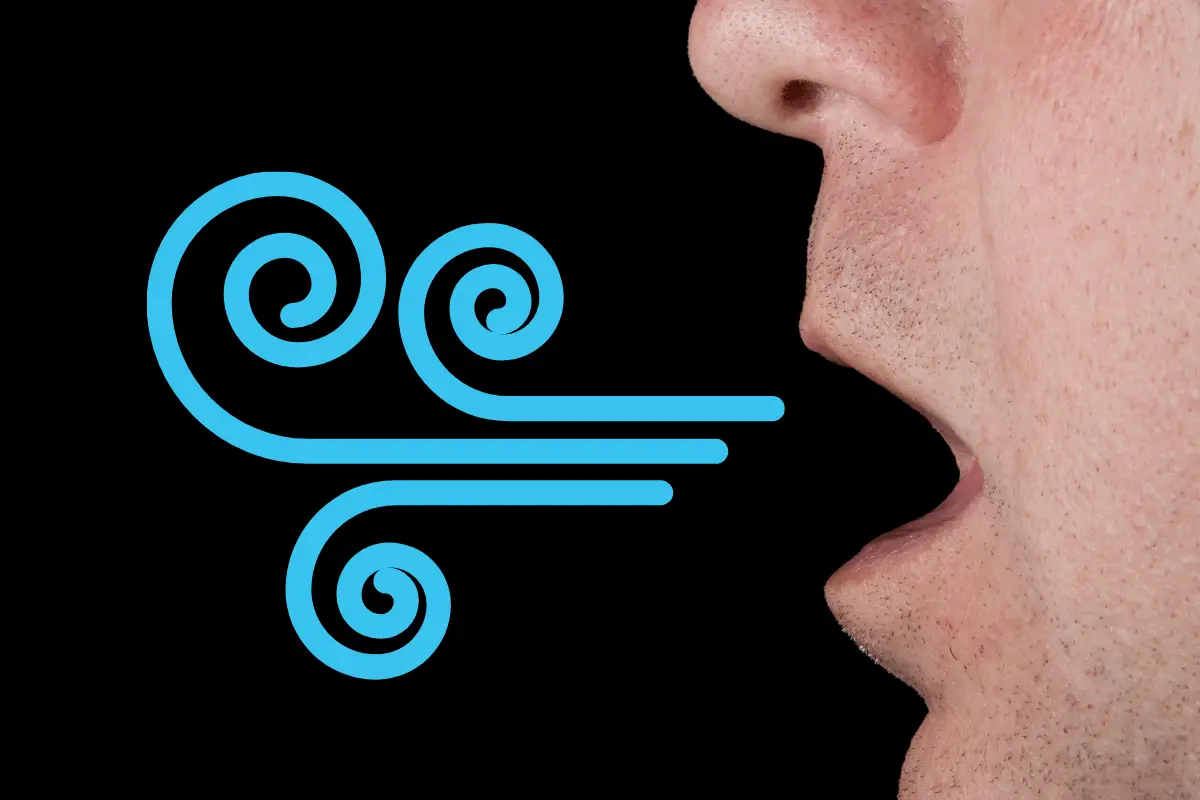Breathy or airy singing voices are one of those things I see all of the time as a music teacher.
From kids to adults to pop music, breathy singing is everywhere.
While using it on occasion as an artistic choice (such as Sam, Smith, Billie Eilish, and Ariana Grande do) is perfectly fine, you want to be able to control when you sing like this to avoid stressing your vocal folds.
This is why I decided to help folks out with this guide on how to sing less breathy.
Breathy singing is caused by the vocal folds not fully closing while singing. Air seeps in through the vocal cords and adds to the tone. Providing more power and energy to your singing voice as well as coordinating the vocal muscles will help you sing less airy.
Let’s look into this topic a bit more and help you improve your singing instantly!

Get all the experience of singing lessons at a fraction of the price (and at your own speed) with 30 Day Singer.
Table of Contents
What Causes Breathy Singing?
When you sing or talk, air passes through your vocal folds, causing them to vibrate.
There are many tiny muscles also working in concert to create different pitches and tones while you talk and sing.
We all know this.
But in breathy singing, the vocal folds don’t close all the way as they vibrate.
There is no seal.
While not directly a problem, this creates an airy tone.
This type of singing is also what constitutes as falsetto in your upper range.
Related Reading: Head voice vs. falsetto guide
What is the root cause of excessive breathiness in singing?
Often, it’s poor breath rather than artistic choice like experienced singers make.
Is Breathy Singing A Problem?
On its own, breathy singing isn’t really a problem, depending on what you prefer.
In pop music, many vocalists use a breathy or airy voice to create a certain feel, especially for ballads and soft beginning sections.
However, some genres and styles of music don’t have a need for breathy singing, and it’s actually undesirable.
Classical singing, such as opera or musical theatre, wants a strong voice that will project to the back of a hall.
Breathy singing is limited in its dynamic power.
Forcing more air and volume through a breathy tone will end up hurting your voice faster.
Also, you want as many tools as possible in your singing toolbelt, right?
If all you can do is sing breathy, you’ll be limited in what you can do.
From a physical perspective, breathy singing doesn’t tire you out any faster than full voice, chest voice, mixed voice, or head voice singing (despite what some may have you believe).
But it does dry out your vocal cords and larynx faster. This could result in injury and fatigue.
Drink plenty of water before, during, and after practice to avoid this problem.
5 Tips For Fixing A Breathy Singing Sound
If you want to get a more powerful singing voice and get out of a breathy sound (and if you’re reading this article, you do!), check out these quick tips.
Warm Up With A Hard “Nnnay” Sound
Pick a simple scale-based warmup pattern that works for you.
Now, do this warmup with the sound, “Nnnay.”
I want you to focus on making the nnnn sound come before the vowel in this case.
When we sing through voiced consonants like “m” and “n,” it forces our vocal cords together in order to project them more.
Really get nasally and “bratty” with your tone as you sing.
Once you switch to the vowel, use a lot of air to keep the tone strong, and your singing tone should stay in a fuller voice.
After you’ve done this a while, shorten the length of the nnn sound to make it sound more natural.
Get Voice Lessons
Nothing beats a lesson instructor.
I can fix most singing problems for most people in minutes (or at least set them on the right path).
But I have to be in person to do it.
Ask around at your local music store for someone who can offer vocal lessons.
A good voice teacher makes a huge difference in finding exactly where you need help.
Imagine Singing To The Back Of A Hall
A big part of breathy singing comes with two things:
- Nerves
- Singing in small spaces
When we sing in the shower, we think we sound great.
You’d be surprised how many people have told me in the past 12+ years as a music teacher how comfortable they feel singing in the bathroom.
Why? No one else is there; they feel safe and comfortable.
Also, the smaller space makes them sound bigger than they actually sound.
Sing in a larger space or get in the mindset of singing in a larger hall.
Imagine you’re trying to fill every inch of a gym with your sound.
Or picture sending your voice flying off to the back of an auditorium.
Doing so requires more air and power.
It’s silly, but this little mental trick really does work.
Bonus: Use a hand gesture to throw your sound when you sing a long, high note, and it’ll help you immensely to get out of the breathy voice.
Start With A Vocal Fry
A vocal fry is when you press your vocal cords as close together as possible and force them to vibrate.
We do it a little bit naturally with our lower notes and when we’re sick.
Practicing this fry will train your brain to recognize these muscles and use them more.
I like to have my students do quick vocal exercises like this one:
- Imagine a creaky gate. Make the sound.
- Now, make the sound with a bright “-ay” syllable. Stretch it out.
- Start with the creaky, vocal fry, and then add more air and power to it.
- Gradually allow your strong, nicer singing voice to come through.
Once you reach a normal vocal tone, you’ve found your full voice! It shouldn’t have a breathy quality at all if you start like this.
Listen To Models For Your Voice Type
I encourage my students and all musicians to listen to great performers on their instrument or specific voice type.
Some types are more prone to breathy tone than others.
Tenors and sopranos are often lighter than baritones, basses, and altos.
But whatever your voice type, it’s best to learn from someone of that type as well.
Powerful tones come from powerful air, so take care of your vocal health and learn vocal techniques from a pro.
30-Day Singer has a great program (you can check out for free) with specific lessons and examples for every voice type and then some.

Get all the experience of singing lessons at a fraction of the price (and at your own speed) with 30 Day Singer.

